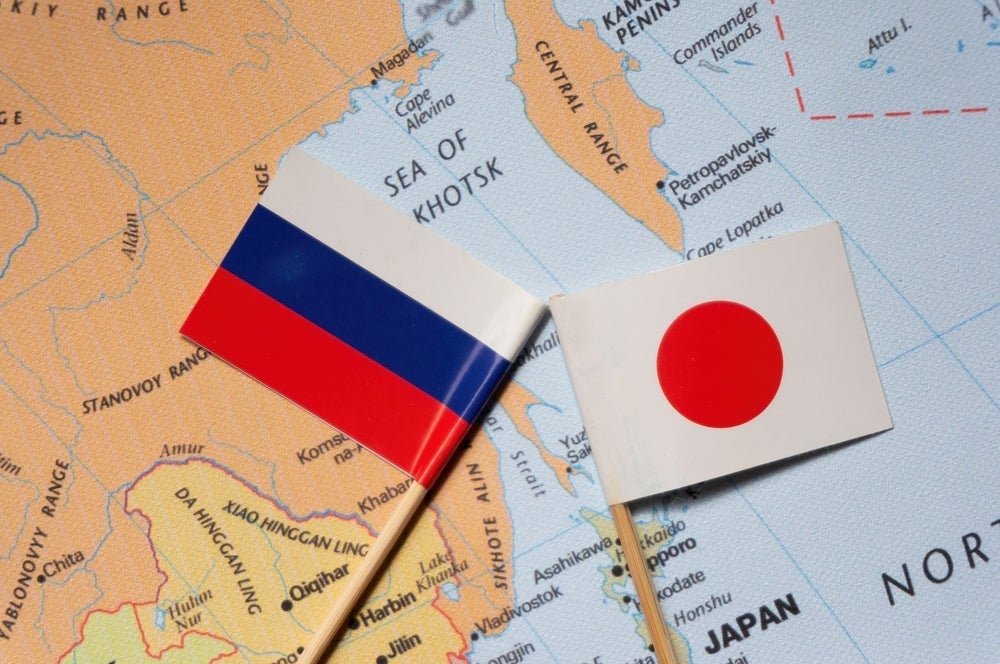
A group of islands with a population of only 20,000 have been causing tension between Russia and Japan since the end of the Second World War: the Kuril Islands, or ‘Northern Territories’ as they are known in Japan.
The area separates the Sea of Okhotsk from the Pacific Ocean and is made up of small chain of 56 islands stretching between the Japanese island of Hokkaido and Russian’s Kamchatka Peninsula. Despite their negligible size, the islands offer a strategic passageway from a military standpoint and economic benefits that neither country is willing to surrender. The source of conflict does not include the islands in their entirety, rather the sovereignty of the South Kuril Islands, consisting of Etorofu, Kunashiri, Shikotan and Habomai.
In August 1945, in the final days of the Second World War, Russia took control of the sparsely populated islands and since then has considered the Kuril Islands to be part of the country. As a result, Japan and Russia have yet to sign a peace treaty officially ending the war and disputes over ownership of the islands remain ongoing.
In 1956, there was hope of an armistice as Russia offered Japan the possibility of regaining ownership of two of the smaller islands, Shikotan and Habomai, in exchange for relinquishing its rights to the remaining larger islands. Japan refused. In 2018, during the East Asia Summit in Singapore, Russian President Vladimir Putin and then Japanese Prime Minister Shinzo Abe again spoke about the issue and agreed to renegotiate based on the 1956 declaration. These planned talks ended abruptly, however, when Russia withdrew from negotiations in March 2022 in response to Japan’s sanctions over the invasion of Ukraine.
The Kuril Islands offer Russia military and political security
The Kuril Islands offer several military and political advantages for Russia. First, due to their geographical position, they make it easier for Russia to manoeuvre its Pacific Fleet of warships and submarines based in Vladivostok into the Pacific Ocean, a task that would otherwise be very difficult during sub-zero temperatures in winter.
Furthermore, Russia remains wary that should Japan regain sovereignty it could use the islands as a base for its armed forces and deploy long-range missiles from them. Japanese authorities have reportedly stated that, should Tokyo regain control, it would allow US marines based in Japan to set up military bases on the Nansei Islands, further heightening concerns for Russia. This could also lead to the Sea of Okhotsk (which is mostly considered to be a Russian jurisdiction) being forced to accommodate foreign-owned military ships.
How well do you really know your competitors?
Access the most comprehensive Company Profiles on the market, powered by GlobalData. Save hours of research. Gain competitive edge.

Thank you!
Your download email will arrive shortly
Not ready to buy yet? Download a free sample
We are confident about the unique quality of our Company Profiles. However, we want you to make the most beneficial decision for your business, so we offer a free sample that you can download by submitting the below form
By GlobalDataCould a potential special economic zone further heighten the islands’ appeal?
In 2021, Putin proposed a potential special economic zone (SEZ) on the Kuril Islands. The zone would enforce Russian law and allow companies within it to operate free from income and property taxes for ten years. Despite obvious economic benefits the proposed zone would generate, this proposal has caused tensions between the two countries. Japan has requested, so far unsuccessfully, a special structure allowing Japanese companies to operate outside the jurisdiction of Russian law on the basis that the ‘Northern Territories’ remain part of Japan. Russia has yet to back down and a final decision is unconfirmed.
Notwithstanding a disagreement in operating terms, should it go ahead, the SEZ would bring with it undisputed benefits. The Kuril Islands could see an influx of foreign direct investment (FDI), although this would be limited by sanctions against Russia, and potentially other improvements such as updated infrastructure.
The Kuril Islands’ economy does have other strengths, however. Its fishing industry has developed substantially in recent years and now provides lucrative economic opportunities. An estimated three million tonnes of fish and seafood are now caught in the waters surrounding the islands annually.
In June 2022, however, Russia put in place a ban on Japanese companies harvesting in the waters near the islands, claiming Japan has failed to pay for the quotas of fish caught. The Kuril Islands are also believed to hold untapped oil and gas reserves as well as one of the world’s largest reserves of rhenium, a rare metal used by medical and aerospace industries.
Has Ukraine invasion killed any hope of settlement on Kuril Islands?
In March 2022, Russia suspended its discussions with Japan over the ownership of the Kuril Islands in the aftermath of the sanctions imposed by Japan over the Ukrainian war. Japanese officials attended the Nato summit for the first time in history in 2022, stating that the country had changed its stance on Russia due to the invasion and consequently would be imposing sanctions.
Japan initially introduced sanctions against Russia and Belarus in March 2022, which included restricting payments to six Russian individuals (including Vladimir Putin), three designated banks, as well as curtailing exports and payments to 49 designated Russian entities. Further sanctions were put forward in July, enforcing yet more restrictions on payments and capital transactions as well as export bans to designated Russian or Belarusian entities.
Russia retaliated by imposing its own sanctions in July, banning 384 Japanese lawmakers from entering the country, with the country’s foreign ministry releasing a statement accusing Japan of “adopting an unfriendly, anti-Russian position notably by expressing unfounded accusations against our country concerning the special military operation in Ukraine”.
Between 1 September and 7 September, Russia held its annual military exercises in eastern Russia. The scheduled Vostok-2022 drills took place across 13 sites, as well as the Kuril Islands, to “guarantee military security”, according to the Russian Ministry of Defence. The training was expected to involve more than 50,000 military personnel and 5,000 units of weapons and military equipment. This raised eyebrows in Japan.
Prior to the drills, in July 2022, Japanese authorities appealed to Russia not to use the disputed islands as base for military training. Japanese Chief Cabinet Secretary Hirokazu Matsuno explained during a press conference in Tokyo: “We have expressed [to the Russian equivalents] our concern about the activity of Russian troops close to our country amid Russia’s ongoing invasion of Ukraine. The government continues to collect information and will act accordingly. The conduct of the military exercises does not coincide with Japan’s position and is unacceptable.”
Does Russia really want to resolve the Kuril Islands dispute?
A 2019 poll by the Russian state-owned polling institution, VTsIOM, claimed that 96% of the Kuril Islands’ residents opposed returning sovereignty to Japan, with only 2% voting in favour (77% of the population living in mainland Russia were also in opposition).
The results show that despite Putin expressing his regret over the ongoing dispute, claiming Russia believed that “the absence of a peace treaty in our relations is absurd”, a move to return the islands to Japan would prove unpopular among Russians. By contrast, it appears that Japan is more willing to negotiate a compromise, with a recent poll in the Nikkei newspaper showing that 46% of Japanese people favour an initial return of two of the islands, compared with 33% who want all four islands returned.
Although negotiations regarding sovereignty over the Kuril Islands have been on and off for many decades, little progress has been made. Continued military operations by Russian forces are causing simmering tensions to heighten, while Japan’s stance on the invasion of Ukraine could be a potential nail in the coffin for any form of resolution.
At some point in time both Russia and Japan have owned the entire chain of Kuril Islands, and it seems unlikely in the current environment that a compromise will be found.






